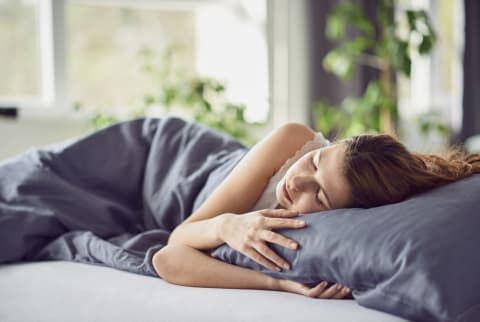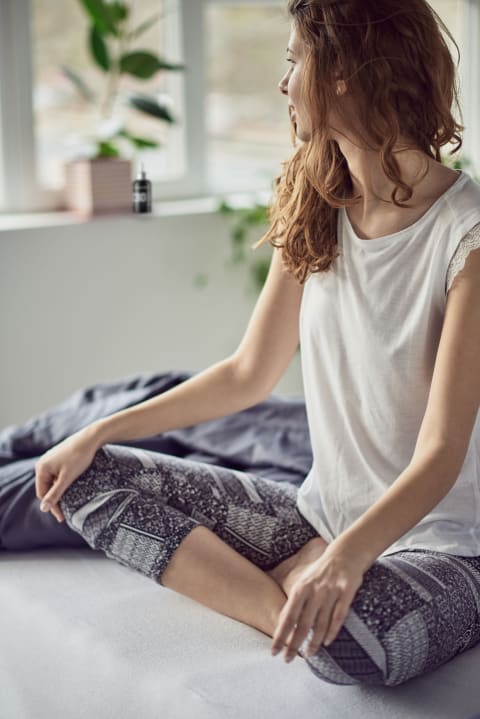Advertisement

People love to talk about sleep—how to track it, how to optimize it, the fact that they need more of it.
And while it's easy to blame a lack of sleep on that late-night hit of caffeine, post-workout adrenaline, or the rabbit hole that is scrolling through social media right before bedtime, there are also some sneakier, lesser-known sleep saboteurs that might be disrupting your circadian rhythm. Here are five of them—plus, a few key fixes that can help you catch those precious ZZZs:
You're eating the wrong foods.
Somehow, in this giant world of sleep information, caffeine has gotten a bad rap—but food has largely stayed out of the scene. That's a mistake, as some foods can also keep you up—particularly aged and fermented foods and anything that's spicy or heavy on the tomatoes.
Aged and fermented foods—like some cheeses and meats, sauerkraut, and other pickled things—contain tyramine, an amino acid that triggers the release of a stimulant called norepinephrine, which can keep your brain awake. And spicy and tomato-based foods are filled with acid, which can cause heartburn and general discomfort throughout the night. No need to skip out on the fermented foods entirely, of course—they're great for your gut!—so just try going for them at least three hours before your bedtime.
You're putting off bedtime.

We've all had that moment when you're relaxing on the couch after dinner, and you glance at your watch and realize it's time to start getting ready for bed. But instead of actually doing that, you think about doing that...and then you check Instagram...and let the next episode start playing…or maybe start listening to a new podcast…and before you know it, it's an hour and a half past bedtime, and you don't really have anything all that cool to show for it.
Sleep experts have given this phenomenon a name1—"sleep procrastination"—and say that it leads to seriously insufficient sleep. To prevent this dillydallying and actually get yourself to bed on time, try making your bed space extra cozy so that you actually look forward to getting into bed instead of thinking of it as yet another thing on your to-do list.
You can also get CBD involved to help the wind-down process along. Try taking NanoCraft's CBD Oil—the brand makes high-quality CBD oil from 100 percent pure hemp and infused their Night Formula, which has 0 percent THC, with natural sleep aid melatonin and pure lavender essential oil to help you doze off smoothly. CBD—the non-psychoactive cannabis compound found in both cannabis and hemp plants—has been shown to help relaxation, and, when paired with sleep hormone melatonin, can help trigger the onset of sleep, getting the brain ready to head into more restorative sleep.
You're marathoning your shows.
It's totally fine to watch some casual TV before bed. We all do it, and if that's one of the things that helps you unwind, go for it. But what you may not realize is that your show-streaming habit could be setting you up to lose sleep without even realizing it.
One survey found that 55 percent of people who reported binge-watching TV before bed ended up losing three hours of sleep that night. The fix: Try to instill a "one or two episodes before bed" rule, and, if that doesn't work, limit it to weekends only. Or—an even more wild idea—just watch the show in real time so you simply don't have the option to binge-watch 10 episodes in a row.
You're sleeping with your dog.
Yes, dogs are amazing for a million reasons, and science says so, too: Research has shown that pet owners tend to be happier people overall. But even if you love your pup, beware of actually inviting him or her into your bed for the night—a 2017 study found that people didn't sleep as well when their dog was in the bed with them, as opposed to simply being in the same room in their own bed—likely because dogs may move around a lot in the middle of the night. If your pup is a constant in your bed, try making him or her a bed right next to yours. You'll still feel protected and loved, without the potential to be woken up from your pet's midnight stirrings.
You're cooped up inside all day.
It's almost a given that, if you live in an urban area, you probably don't spend enough time outside. After all, cities are primed to help you live a conveniently indoor life, thanks to show-streaming services (see above) and near-instant delivery of anything we could need.
There are plenty of great reasons to regularly get fresh air, and better sleep is one of them: A study found that people who are exposed to bright sunlight during the day, particularly in the morning from 8 a.m. to noon, tend to sleep better at night than those who don't get as much light—and they also reported feeling less stress and depressed, too.
That's because hanging out in natural light during the day boosts serotonin, a neurochemical that helps your body set its internal circadian clock—which is key for establishing solid sleep patterns. To get a healthy dose of sunshine, try adding a morning walk or jog to your routine, or taking a walk outside during your lunch break. And before you go to bed, consider a melatonin supplement, or NanoCraft's CBD Oil Night Formula with melatonin. Similar to natural light, melatonin also helps regulate your internal circadian clock, so you'll be going double duty in the circadian rhythm department—and the relaxing CBD is an extra sleepytime bonus, too.
